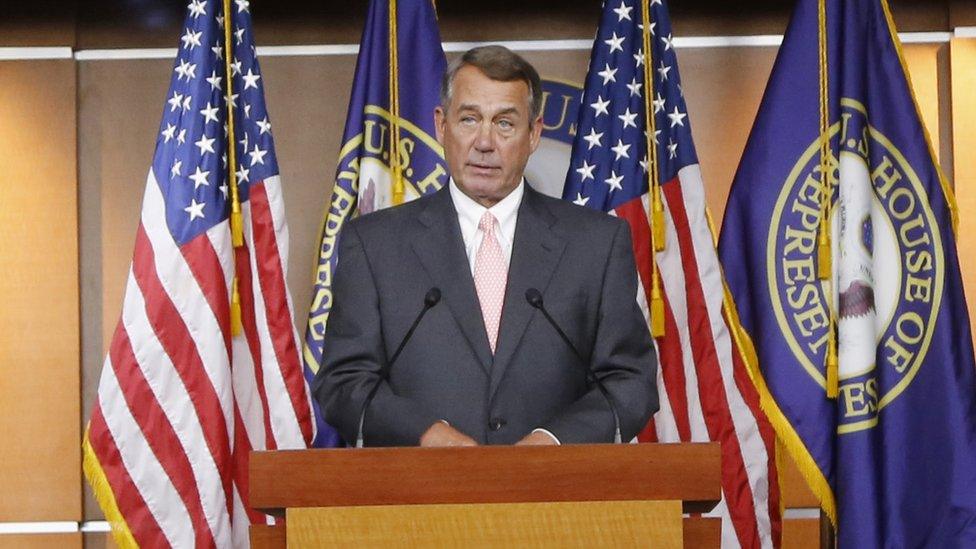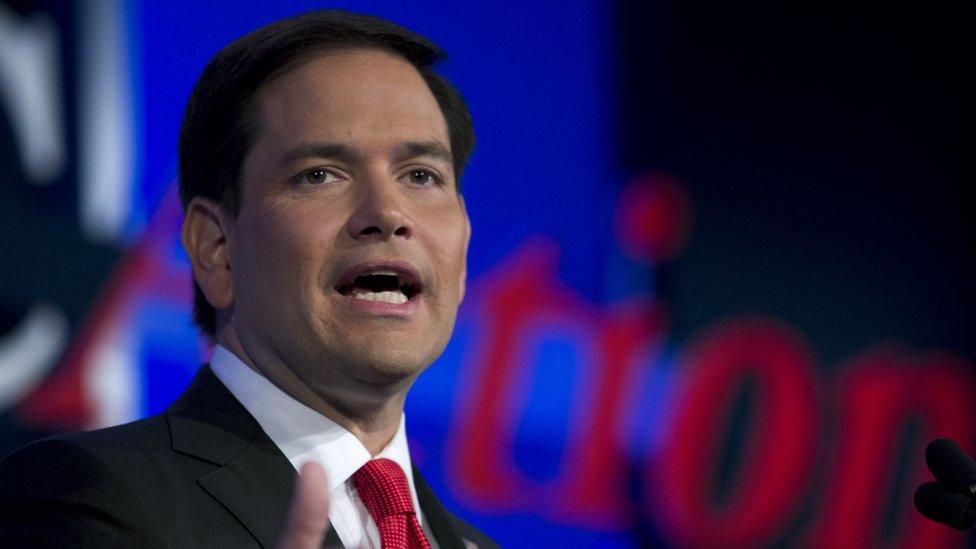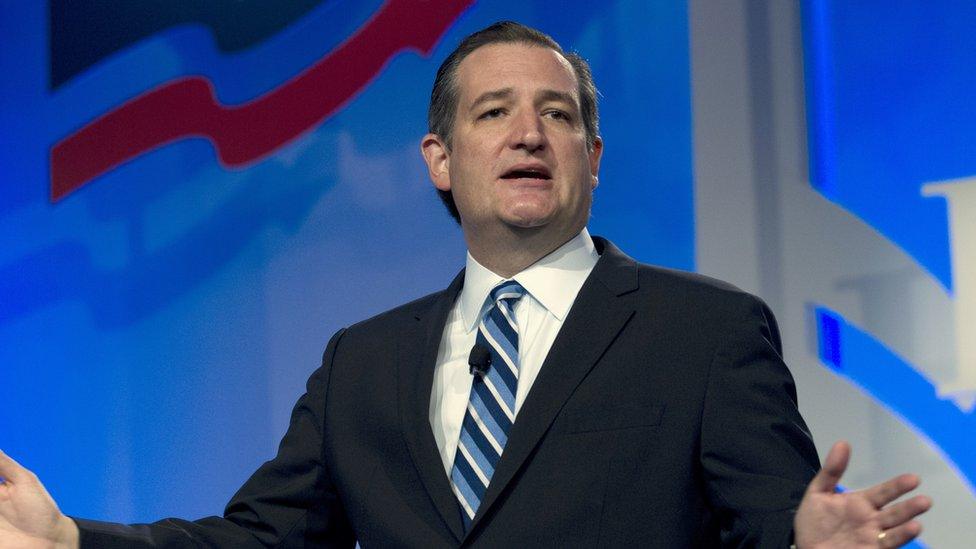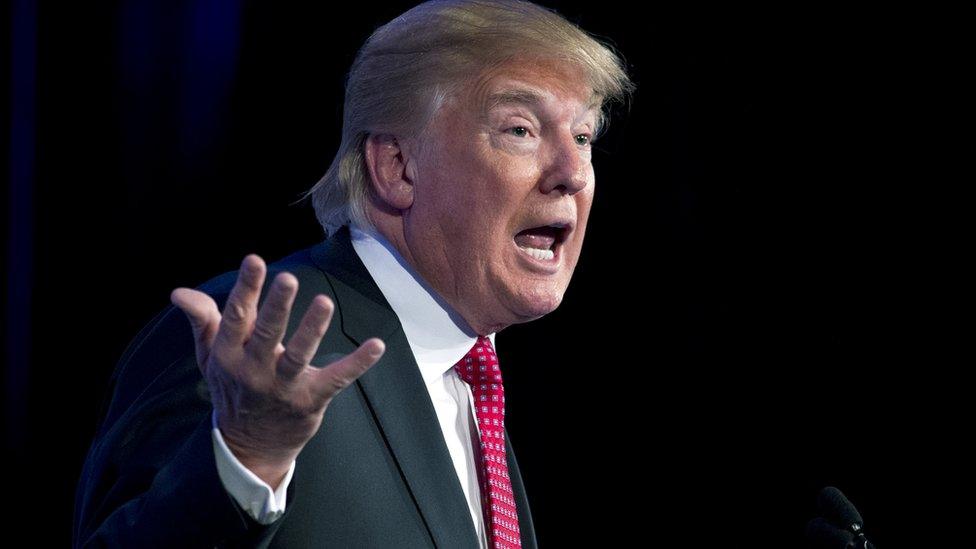John Boehner is just the first victim of an angry Republican base
- Published
- comments

John Boehner says he will retire to avoid a protracted leadership fight in the House of Representatives
The anti-establishment forces that have roiled the Republican Party over the past few months have claimed a big prize.
Citing the need to prevent "irreparable harm" to the institution of Congress and avoid a leadership struggle, Speaker of the House John Boehner announced on Friday he was resigning at the end of October.
This was far from the first time Mr Boehner has faced challenges to his authority as the top Republican in the House of Representatives. Over his five years as speaker he's faced withering criticism from the right wing of his party as he balances the necessity of passing essential legislation to keep the US government operating with calls to be more forceful in advancing conservative priorities.
But this time, it seems, was different. Although Mr Boehner asserted that he would once again defeat those who wanted to remove him from office, he wasn't going to wage the pitched political battle that would require.
This time around, Mr Boehner faced a different kind of adversary. Where before the challenges to his authority came from within the halls of Congress, now calls were reverberating across the nation, inspired and egged on by Republican presidential candidates who were campaigning against the Republican leadership in Congress with the kind of vehemence that was traditionally the province of Democrats.

Evangelical activists cheer when Marco Rubio announces Mr Boehner's resignation
Real estate mogul Donald Trump has shot to the front of the Republican field with his pox-on-both-houses condemnation of business as usual in Washington. Texas Senator Ted Cruz, long a thorn in the side of Republican congressional leadership, regularly garners his biggest cheers when he bashes Mr Boehner and Senate Republican leader Mitch McConnell by name.
"We win elections, and then the people we elect don't do what they say," he told a grass-roots conservative audience in Atlanta in July. "Our team is playing for the other side."
As it so happened, the news of Boehner's impending resignation broke as many Republican hopefuls were gathering at a Washington, DC, hotel for a conference of evangelical conservative activists called the Values Voter Summit.
Florida Senator Marco Rubio was the man who announced the news to a packed ballroom, and the crowd celebrated the announcement with a standing ovation.
"I'm not here today to bash anyone," the senator said. "But the time has come to turn the page and allow a new generation of leadership in this country."
Other candidates taking the stage that day were less circumspect. Mr Cruz, during his speech, pointed to the audience and said Mr Boehner's resignation was evidence that grass-roots conservatives like them "terrify Washington".
He followed it up by warning that if Mr Boehner negotiated an agreement with Democrats over the budget that funds Planned Parenthood and Obamacare on his way to a cushy private-sector job, "that is not the behaviour one would expect of a Republican speaker of the House".

Ted Cruz warns Mr Boehner not to strike a deal with Democrats before heading to a "cushy" private-sector job
Mr Trump said that while some people may like Mr Boehner on a "personal basis", he ended up just like all the other politicians who get elected promising change.
"They're full of vim and vigour," he said. "Then they come down to these magnificent vaulted ceilings that you see all over Washington. And what happens? They become different people."
Notably missing from the parade of presidential contenders at the Washington gathering were former Florida Governor Jeb Bush, Ohio Governor John Kasich and New Jersey Governor Chris Christie, none of whom is much loved by the type of conservative true believers in attendance.
Perhaps not surprisingly, then, the three candidates who are perceived to be vying for support from the party's establishment praised the speaker.
"Ohio and America are stronger today because of John Boehner," Mr Kasich said. "He leaves a legacy of unparalleled integrity and steady, mature leadership during difficult times that will be a model for future speakers and anyone interested in public service."

Donald Trump has become the face of the anti-establishment wave sweeping over the Republican Party
Mr Bush tweeted that Mr Boehner "dedicated his life to public service" and praised his part in bringing Pope Francis to the Capitol on Thursday.
Such kind words were a marked contrast from the views expressed by the Values Voter Summit attendees as they filed out of the event hall for lunch. Candidates like Mr Bush should be concerned that the anti-establishment tide that felled Mr Boehner may signal trouble ahead for their presidential aspirations.
"I been working for three or four years trying to get that man," Carl Jernigan of Shoal Creek, Alabama, said of Mr Boehner. "He's a big part of the leadership which has failed us over and over again, giving Obama everything he wants."
He added that he has more disdain for Republicans like the speaker than he does Democrats.
"Boehner is just the first step," he said. "We've got to clean up the whole mess."
Larry Farnes of Missoula, Montana, noted Mr Boehner's propensity for tears and said Republicans need "a leader who rallies the troops and rallies Congress".
"It's time for change," he concluded.
The initial front-runner to replace Mr Boehner as speaker is his second in command, Kevin McCarthy of California. Given that he's part of the same Republican leadership team, however, he's already being targeted by some of the same grass-roots conservatives who celebrated Mr Boehner's impending departure.
"McCarthy is a non-starter for conservatives, and the bad blood will continue," writes, external Erick Erickson of the conservative RedState blog.
Daniel Webster, a junior congressman from Florida, has already announced, external his candidacy for the speakership, indicating that the protracted House leadership fight that Mr Boehner had hoped to avoid may happen anyway.
Outside the hotel where the Values Voter Summit was being held, Dean James stood on a corner, hold two large placards condemning Planned Parenthood and illustrated with photographs of dismembered foetuses.
For him, the current abortion fight in Congress is the central political issue facing the US, but he was far from heartened upon hearing the news that Mr Boehner was heading for the exit.
"Have they done anything?" he asked. "Until they act, I haven't seen anything. It's just business as usual in Washington."
Washington business may be about to change, however.